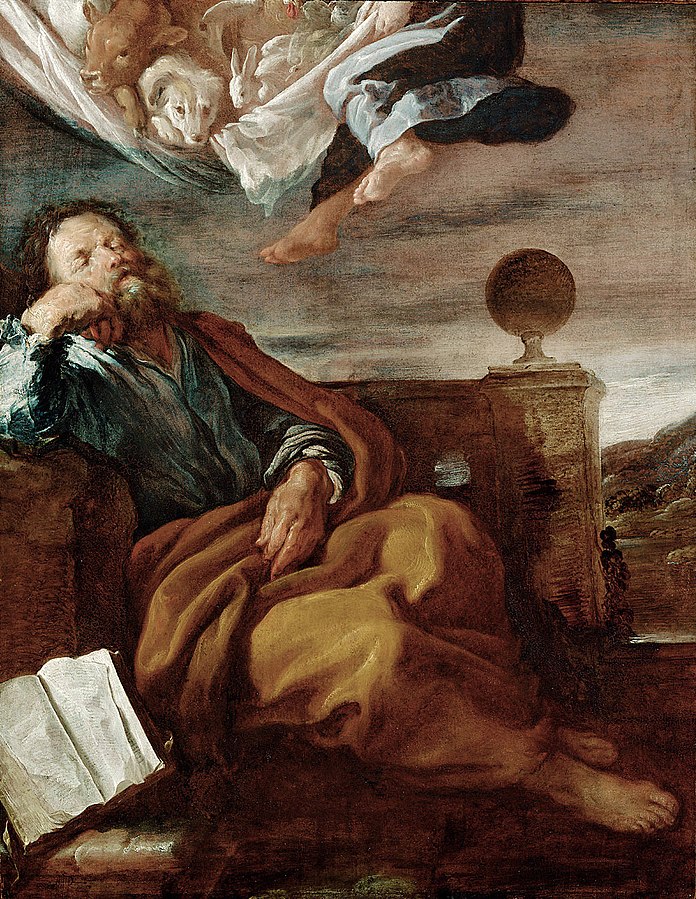
I celebrated Mass in the afternoon, so my thoughts about the readings are coming together. Being away from home I don’t have so many resources and notes. I’ll just jot a few things down for you and if you find them useful, I’ll be content.
First, please pray for a priest I know who has cancer. Rather, cancer again. Tough decisions in his life now and uncertainty. In your goodness pray for Fr. J.
Some thoughts on Pentecost Monday in the Vetus Ordo. Of course it has to be Vetus Ordo… RIGHT?!?
We’ve had an Octave to observe Pentecost from the time of St. Pope Leo I “the Great” (+441). The days of the Octave had their Station Churches and today, Monday, was St. Pietro ad vincula. Yesterday was St. Peter’s in the Vatican. Today, in the Gospel, we hear from Acts 10, that critical moment when Peter, having been instructed by God, does away with the kosher laws and then, having entered the house of the gentile Centurion Cornelius, preaches so that the Holy Spirit descends on Jews and gentiles alike. This is a critical moment in the Church. Was it to be a sect or off-shoot of the Jews only?
Remember that the Lord, when He initially rejected the plea of the non-Jewish woman for healing, said that His mission was not to the gentiles. When gentiles sought Jesus through Philip and Andrew (Greek names), the Lord said His hour had come and the Father’s voice was heard from the third time. In Acts 10 the time has explicitly come for the Apostles to go to “all nations”. While Paul is the quintessential apostle to the gentiles, Peter takes the definitive step, which is truly his to take as head of the College of Apostles.
An interesting feature of the Mass is the Introit, which is also the Introit for Corpus Christi (thanks to St. Thomas Aquinas). The point is about feeding. Pentecost was a time of baptizing and 1st Communion for the neophytes.
The Gospel reading at first left me a little puzzled, from John 3 when Christ is talking with Nicodemus about a man needing to be born again. But the pericope is mostly about the conflict of light with darkness. It begins with the famous John 3:16. Don’t forget Leviticus 3:16!
In any event, this seems to be about the conflict of the those who are in the light, filled with the Holy Spirit, with those who are instead filled with the darkness of this world. Taken this way, the Gospel presents a stark set.
In fact, I think this makes sense of the Postcommunion, which speaks to the dark set as the enemy. Attention you (bishop!) out there who think that we don’t have enemies. Here’s a slap of reality:
Orémus.
Adésto, qu?sumus, Dómine, pópulo tuo: et, quem mystériis cœléstibus imbuísti, ab hóstium furóre defénde.
Be present to Your people, we beseech You, O Lord, and defend those whom You have penetrated with Your heavenly sacraments against the fury of the enemy .
In the Gospel for Pentecost, we heard the Lord speak of “the prince of this world” at the very end of the Last Supper, leaving the last cup unconsumed, going forth into the night singing psalms: “I will no longer talk much with you, for the ruler of this world is coming. He has no power over me; but I do as the Father has commanded me, so that the world may know that I love the Father. Rise, let us go hence.” Now, the first day of the Octave, we hear the themes of light and dark, of enemies.
No wonder Pentecost is associated with the Sacrament of Confirmation!


































This might be wrong, and I know that it is not the same as an octave, but I remember being told in Italy that under JP2 an option was instituted for celebrating (in the N.O.) the (votive, using red vestments) Mass of Pentecost on the Monday and Tuesday after Pentecost as these days were (and the Monday still is) a national holiday. I seem to remember someone told me the same thing for the U.S. (without the reason). I have never tried to hunt down documentation of this option.
Beautiful way of stating it:
“Be present to Your people, we beseech You, O Lord, and defend those whom You have penetrated with Your heavenly sacraments against the fury of the enemy .”
Fr Dana, please intercede for Father J.
Pentecost is the ORIGIN of the Sacrament of confirmation, per Augustine.
It is also associated with Holy Orders, along with Christ breathing on the Apostles in the upper room in John 20.
Of course your thoughts are helpful. We’re down to like two reliable sources of anything remotely Catholic. Fr. Z it just occurs to me reading this we are really fortunate, are we not, to be alive during a time when being a faithful Catholic is made so hard. I mean I prefer easy but there is lots of merit in the hard times.